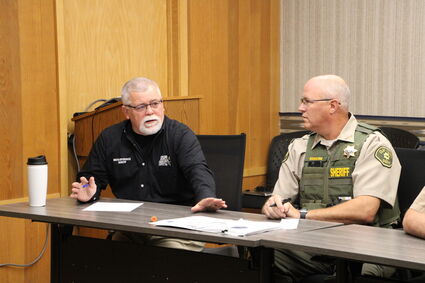Sen. Ernst discusses opioid crisis during O'Brien County stop
Senator hosts roundtable with area law enforcement officials
September 29, 2022

NICK PEDLEY/SENTINEL-NEWS
Overdose reporting, fentanyl and border control were some of the main topics discussed during Sen. Joni Ernst's visit to Primghar on Monday morning.
A growing problem that some feel is an impending public health crisis took center stage in Primghar on Monday.
Sen. Joni Ernst hosted a roundtable with area law enforcement regarding the growing opioid crisis in America. The Republican fielded updates on overdose tracking and also listened to problems drug enforcement agencies face when trying to prevent narcotics from harming their communities.
"They are poisoning our communities, and it is absolutely intentional," Ernst said. "We can't pretend it's not happening. It's devastating."
Dan Neill, executive director of the Midwest High Intensity Drug Trafficking Area, shared information about increasing reporting for overdose maps. He said data about overdoses related to fentanyl and heroin is often lagging, which makes it hard for law enforcement to track "bad batches" and prevent future deaths.
Neill said there is a dire need for centralized data in his agency's seven-state territory, which includes Iowa.
"That way they can be proactive instead of reactive to it, instead of waiting several days and someone dies," he said. "It's just not in Des Moines. It's in your rural counties and rural cities."
Fentanyl is a synthetic opioid that is approved for treating severe pain. According to the CDC, it is 50 to 100 times more potent than morphine and carries a high risk for addiction and dependence. It can cause respiratory distress and death when taken in high doses or when combined with other substances, especially alcohol or other illicit drugs like heroin or cocaine. Just two milligrams of fentanyl, or the amount that could fit on the tip of a pencil, is considered a potentially lethal dose.
Those in attendance said receiving information from medical officials about potential overdoses is extremely difficult. Oftentimes hospitals are afraid of violating the Health Insurance Portability and Accountability Act (HIPAA), which makes tracking overdoses next to impossible.
"Our medical communities, in the small areas anyway, almost stonewall us on a daily basis," said O'Brien County Sheriff Bruce Devereaux.
Ernst was startled about the lack of reporting between the medical community and law enforcement.
"It really is surprising to me that in this data-driven, technological age that it hasn't been tracked better," she said. "HIPAA was not put in place to protect this type of reporting."
Devereaux also noted the cost and availability of naloxone, commonly known by its brand name Narcan. Though law enforcement officers and medical personnel carry the life-saving drug in the event of an overdose, there is often not enough on hand for everyone involved in a crisis situation.
"They should have enough for every person in the ambulance [on a call]," Devereaux said. "We just haven't gotten to the point where they realize that. I've been working on that with our EMS director."
Increased overdose reporting will also help officials improve distribution of Narcan, Neill said. Sioux City Police Chief Rex Mueller said he's given more life-saving awards to his officers in recent years than ever before because of Narcan, and believed more communities needed to be prepared.
"In northwest Iowa, we were somewhat immune to it for several years. That's done," he said. "It's here, we're seeing it everyday and it's nothing short of a public health crisis. I don't think you can understate how bad it is or how bad it will get."
In addition to better reporting, those in attendance believed stemming the flow of illegal drugs at the southern border would be key to reducing the opioid crisis. The flood of drugs being distributed by Mexican cartels needs to be stopped, they said, which starts with increased border enforcement by the Biden Administration.
"This stuff should not be coming into the country, period. If we had better control of the border and who was allowed in, then we could take care of a lot of this," said Ernst. "This should not be a political issue. We should control our border, bottom line."

NICK PEDLEY/SENTINEL-NEWS
O'Brien County Sheriff Bruce Devereaux (left) and Clay County Sheriff Chris Raveling (right) discuss issues with drug overdose reporting during a meeting with Sen. Joni Ernst Monday morning in Primghar.
Outside of Mueller, the rest of the roundtable was comprised of sheriffs from rural counties. They said meth is still the No. 1 drug impacting their communities, but believed the tide would eventually turn to fentanyl.
"Eventually the wave gets to you," said Woodbury County Sheriff Chad Sheehan. "Are we going to be able to somehow learn from the people who have already been through the wave, and are we going to be able to learn from them to minimize the impact here?"

